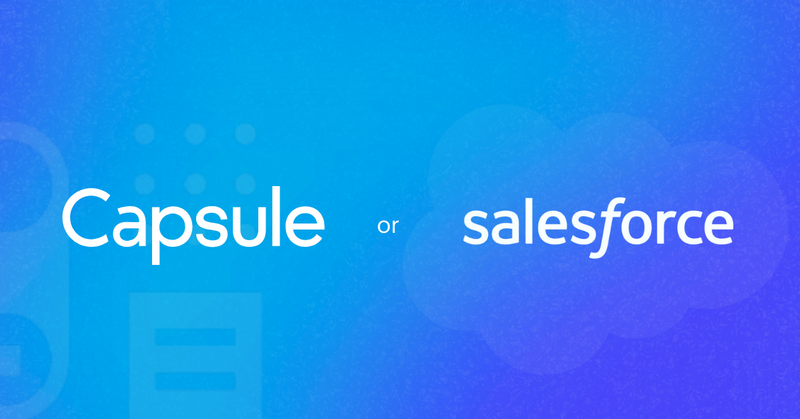Choosing the right customer relationship management (CRM) software can be a game changer for your business. A good CRM helps you organize customer data, streamline sales, and enhance productivity across teams. However, with so many options available, selecting the best fit can be challenging.
Capsule and Salesforce Sales Cloud are two well-known names in the CRM world, each serving distinct types of businesses.
In this guide, we’ll compare Capsule CRM and Salesforce across key areas like pricing, features, ease of use, and customer support. By the end, you’ll know which CRM is better suited to your business needs.

Capsule and Salesforce plans compared
For small businesses and startups, access to a free or affordable CRM plan lets you get a taste of the software to see if it’s a good fit for your business.
Capsule comes with a free plan for individuals and small teams, including the following features:
- 2 users
- 250 contacts
- 5 custom fields
- 1 customizable pipeline
- Gmail and Outlook integrations
- Unlimited “Tracks” for repeating tasks
- Unlimited custom lists
Capsule’s free plan gives you all the essential tools to start managing your customer relationships more effectively. You get access to contact management, task management, and product management features, plus much more.
Salesforce unfortunately doesn’t offer a free version of Sales Cloud, but you can sign up for a free 30-day trial.
Capsule’s Starter plan offers some additional features and increased limits. Salesforce’s entry-level plan is the Starter Suite, which offers contact management and email integration.
| Capsule Starter plan | Salesflare Growth plan |
|---|---|
$17 per user/month | $29 per user/month |
30,000 contacts | Unlimited contacts |
50 custom fields | 25 email finding credits |
Sales pipeline dashboard | Default reports and dashboards |
Gmail/Outlook integration | Gmail/Outlook integration |
Project boards | Email and website engagement tracking |
Capsule’s Starter plan increases your contact limits and adds premium add-ons to connect Capsule with your other tools. You can also use Project boards to organize your post-sales activities and manage all of your interactions across the customer lifecycle with a user-friendly Kanban view.
The Salesforce Starter Suite has plenty of useful features that help with account, contact, lead, and opportunity management. Other notable features include Einstein Activity Capture for syncing email and calendar data, along with Campaign Management for organizing marketing campaigns across multiple channels.
For the full CRM experience, both platforms have advanced tiers. Capsule’s Ultimate plan focuses on helping users get the absolute most out of their software, with access to a dedicated account manager, ongoing priority assistance, and custom training – all for just $73 per user per month.
You’ll also automatically get all the features from the lower-tier plans, such as multiple sales pipelines, multiple project boards, advanced reporting, and workflow automation.
Salesforce offers an Unlimited plan, with conversation intelligence, lead scoring, relationship insights, and additional predictive AI features, coming in at $330 per user per month. The Einstein 1 Sales plan adds generative AI along with unified data and sales planning, for $500 per user per month.

What features and functionality do Capsule and Salesforce offer?
Capsule delivers a powerful CRM while keeping things simple. It offers essential features like customizable fields, pipelines, and workflows designed to streamline customer management and sales processes.
For example, Capsule’s Tracks feature lets teams create standardized task lists for routine processes, helping maintain consistency and save time. Paired with workflow automation, Tracks can trigger automatically when set criteria are met, keeping tasks on schedule without constant management.
Capsule also supports contact management, project management, reporting, and email integration, making it a well-rounded CRM for small to medium-sized businesses aiming to optimize their sales and customer relationships.
Salesforce, on the other hand, is built for enterprise-level customization and scalability. Its advanced features include customizable sales processes, in-depth automation powered by Salesforce Flow, and robust reporting and analytics capabilities.
Salesforce also supports highly detailed customer records, complex sales forecasting, and predictive analytics, making it ideal for businesses with sophisticated sales and marketing needs.
Which CRM connects best with your existing software?
Your CRM is more effective when it can access and share data with your other existing tools. A well-integrated CRM centralizes customer information from various sources, helping your teams stay organized and make data-driven decisions more efficiently.
Capsule is designed to fit smoothly into your business processes with a wide range of built-in integrations. Its App Marketplace features essential tools like Google Workspace, Microsoft 365, QuickBooks, Mailchimp, and Transpond.
If you can’t find the app you want in the Marketplace, you can connect with thousands of additional apps through Zapier. Capsule’s open API also allows custom integrations for businesses with unique requirements.
Salesforce offers a similar AppExchange, with thousands of third-party integrations and add-ons covering everything from marketing automation and customer service to data analytics and enterprise resource planning (ERP).
However, if you want to connect to other apps with the web services API, you’ll either need to be on the Pro Suite plan (and pay an extra $25 per user per month charge) or be on the Enterprise plans and above.

Which CRM is best for ease of use?
The more user-friendly a CRM is, the more likely your team will use and benefit from it. Capsule is renowned for its simplicity, offering an intuitive interface that minimizes the learning curve for new users.
Setting up Capsule requires minimal technical expertise, allowing small teams to get started quickly and focus on building customer relationships. Features like Tracks and customizable pipelines are designed for ease of use, providing functionality without being overwhelming.
Salesforce, while incredibly powerful, has a reputation for being complex. Its extensive customization options and advanced features can undoubtedly be useful for large enterprises, but they also make onboarding and setup more time-consuming.
Many businesses end up hiring dedicated administrators or external consultants to configure Salesforce effectively. For small teams or those new to CRMs, this steep learning curve can present a significant challenge.
Which CRM is best for pricing and affordability?
Capsule’s pricing is transparent and budget-friendly, offering core features without requiring costly add-ons.
With a free plan for small teams and paid plans starting at $17 per user per month, Capsule ensures businesses can scale their CRM usage without breaking the bank. Meanwhile, larger businesses can take advantage of the Enterprise plan at $73 per user per month.
Salesforce’s pricing starts at a higher tier, with its most basic plan costing $25 per user per month, while the top-tier plans come in at $500 per user per month.
However, the real costs often come from additional modules, integrations, and customizations, which can quickly increase the overall investment. For small businesses with limited budgets, this can make Salesforce less appealing.
Salesforce is a powerful CRM, but its price tag is too high for some companies. Capsule is a more affordable option for small to medium-sized businesses, offering all the functionality you need at reasonable prices.

Which CRM offers more customization and flexibility?
Every business is unique, and the best CRMs should be capable of adapting to reflect the way you work. Customization is an important feature to look out for, allowing you to tailor workflows, pipelines, and data fields to your specific needs.
Capsule strikes a balance between simplicity and adaptability. It offers customizable pipelines, fields, and tags to organize your data and processes without needing technical expertise. These features make Capsule ideal for small to medium-sized teams that need a flexible yet straightforward CRM.
Salesforce is known for its strong customization features, offering near-limitless possibilities for businesses with complex workflows. Users can create custom objects, fields, and workflows, meaning the CRM can fit their exact requirements.
However, this level of flexibility comes with a steeper learning curve and higher maintenance costs, often requiring in-house administrators or external consultants to set up and maintain.
Which CRM is best for customer support and security?
Your customers trust you with their data, making it your duty to protect that information and keep it secure. Choosing a CRM with dependable customer support and robust security measures is critical to maintaining a smooth operation and safeguarding sensitive business data.
Capsule offers responsive support across all plans, with email-based assistance and access to a comprehensive online knowledge base. For businesses on the Ultimate plan, Capsule provides a dedicated account manager and personalized training, ensuring hands-on help when needed.
Salesforce has a tiered success plan system. The Standard success plan gives you access to knowledge articles and the Trailblazer community, the Premier success plan gets you 24/7 access to customer support and the Signature service gets you the fastest response times and proactive monitoring.
While Salesforce’s enterprise-grade resources are impressive, smaller businesses may find the extra costs less appealing.
On the security front, both Capsule and Salesforce adhere to the highest industry standards, including data encryption and regular backups. Capsule’s track record includes 99.99% uptime and no history of data breaches, providing reliable security for its users.

Which CRM is better for my organization?
Choosing between Capsule and Salesforce ultimately depends on your business needs and priorities. Both CRMs bring unique strengths to the table, catering to different audiences and use cases.
Capsule is ideal for small to medium-sized businesses seeking a simple, affordable, and user-friendly CRM. Its focus on ease of use, transparency in pricing, and practical features makes it a strong choice for growing teams that want to get started quickly and scale their CRM capabilities over time.
Salesforce, on the other hand, works best as an enterprise-grade CRM designed for larger organizations with complex workflows and extensive customization needs. It has a lot of strong features and can be expanded with other modules and add-ons if you’re willing to pay the higher price.
Ultimately, larger enterprises with larger budgets may find Salesforce a good fit. However, if you’re a smaller team looking for an accessible, straightforward CRM, Capsule provides everything you need to organize contacts, manage pipelines, and nurture customer relationships.
Try any Capsule plan free for 14 days or sign up to our free plan to get started with a simple yet powerful CRM.




